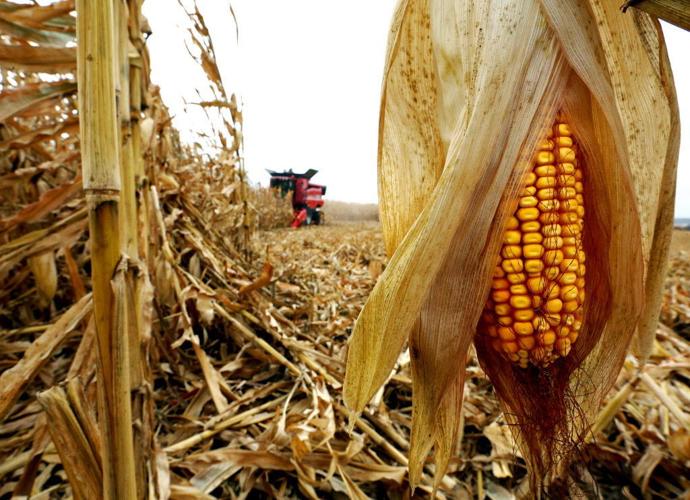It sounds a lot like Monsanto, but Pima County officials are mum about with whom they’re discussing a possible tax incentive package for what they call “Project Corn.”
County Administrator Chuck Huckelberry said earlier this week that he planned to meet Thursday with officials of PricewaterhouseCoopers, a global professional services and accounting firm. He said it represents another company that plans to invest $82 million in a greenhouse project to grow seed corn in Avra Valley, in unincorporated Pima County northwest of Tucson.
Huckelberry said he can’t discuss specifics until he’s released from a confidentiality agreement with the corn growing company.
But his comments came only a few days after the global biotech giant Monsanto confirmed plans to build a greenhouse to grow corn and soybeans in the Tucson area. Huckelberry said the company will create about 60 jobs — Monsanto said 40 to 60.
This week, Monsanto provided some more details about its planned operation but declined to discuss incentive negotiations.
“We’re in the early stages of the project, so nothing further,” said Christi Dixon, a spokeswoman for Monsanto, headquartered in the St. Louis area.
She added, “As part of our due diligence process, we are meeting with all the different permitting authorities and will be prepared to initiate the permitting process at the appropriate stage of development.”
County communications manager Mark Evans said the county has no records of Monsanto development plans or zoning change requests or other applications by anyone to build a greenhouse.
Correspondence does exist between county officials and others in which Monsanto’s name is mentioned, he said. “It is in the best interest of the county to not release those records at this time as their disclosure may do serious harm to the county’s economic development efforts,” said Evans.
An incentive package with Monsanto could stir controversy for a county government already in court over incentives it has given to World View to make helium filled balloons for space tourism and research.
Earlier this year, the county Board of Supervisors approved spending $15 million to build World View a manufacturing center, headquarters and balloon launch pad. The county is being sued by the Goldwater Institute, which says the arrangement violates the state’s gift clause. County officials note the deal requires World View to have 400 people on its payroll at an average $60,000 pay after 15 years.
A controversy over Monsanto would most likely arise over the company’s global track record as a breeder of genetically modified crops and its production of the herbicide Roundup, among other issues. Monsanto has said that its greenhouse here would grow predominantly non-GMO crops.
County Supervisor Richard Elias has said he won’t support incentives for Monsanto. Supervisors Ramon Valadez and Ray Carroll don’t have a stance yet. Supervisors Ally Miller and Sharon Bronson didn’t respond to a request from the Star to comment.
“I’m not interested in making that kind of investment,” said Elias, a Democrat. “It seems to me that Monsanto’s not really a company that we want to have as a community partner. I’m not sure that (they’re) good for anybody on earth.”
Huckelberry countered, “I’ll work with any company that has jobs and payroll and makes capital investments. There are two sides to every story.”
He didn’t respond to a follow-up question about how that stance is consistent with his longtime opposition to the proposed Rosemont Mine, a $1.5 billion copper project in the Santa Rita Mountains that would bring 400 jobs.
modify corn genes
Dixon said the Tucson-area greenhouse project fits well with what she called Monsanto’s commitment to sustainable agriculture and providing farmers with tools that bring better harvests. She quoted a company investor presentation that said investment plans for Arizona are part of Monsanto’s “key growth drivers in corn.”
She called the greenhouse project “an advanced germplasm development facility” that will support the production of conventional and genetically modified corn seeds for farmers’ future use. Germplasm is the basic genetic material for any plant.
Monsanto Chief Technology Officer Robb Fraley said recently that “the tools we are using today,” including greenhouses, “completely change the way you breed crops. Society has been breeding crops for 8,000 years. What we have done in the last four or five, when you can sequence every gene in a corn plant and when you can test with the level of precision, when you can use the capabilities we have for seed production — is incredible.”
The immediate benefit with enclosed production of corn, soybean and cotton is that the company can dramatically increase the number of crossbred seed types, he said. Given many factors including the ability to grow seed at any time of year, the company will make a million “crosses” this year and select the best 100 of them for future production, dramatically increasing productivity, he said.
Critics say Monsanto’s techniques risk limiting crops’ genetic variety. Such variability is important for crops to resist pests or plant disease or to tolerate drought, said Doug Gurian-Sherman, the Center for Food Safety’s director of sustainable agriculture in Washington, D.C.
“We can predict a particular need in a crop such as drought resistance, but a lot of things are not predictable and it’s important to maintain a broad base of diversity in our crops,” said Gurian-Sherman.
Many scientists are concerned or convinced that for corn in particular, the genetic variability and seed varities out there are quite narrow, making them less resilient and more vulnerable to new pests or climate change, he said.
“One major concern has to do with the control these companies such as Monsanto have,” he said.
Another critic said the county should look carefully at a planned merger between Monsanto and Bayer.
“How might that merger — and the ensuing new company — affect any commitments the company makes to the county in terms of job creation? Monsanto has been ... actively looking to merge with another company over the last several years – including a failed bid to purchase Syngenta. So, how strong of a commitment is the company making to the county, and what happens if it fails to deliver?” asked Ben Lilliston, of the Minneapolis-based Institute for Agriculture and Trade Policy.
Two University of Arizona agricultural researchers see no problem with providing Monsanto incentives. They said Monsanto is on balance a good company.
“Monsanto is in the seed business, it’s an agricultural biotech company,” said Yves Carriere, a UA entomology professor who was a co-author of a recent National Academy of Sciences report that found no safety risks from eating GMO-based foods but said the products didn’t always live up to their backers’ promises.
“They should not be treated differently than any other company. If it’s perceived economically as a good deal for Arizona, then go for it.”
Monsanto has made mistakes, no doubt, but in the university’s dealings with them, “I don’t see them as an evil entity,” said Jeff Silvertooth, associate dean for coooperative extension and economic development.
“I don’t know enough to say whether they should or shouldn’t get incentives from a political perspective. But I’m an agronomist. They’re providing good tools. Overall, they do good things.”







